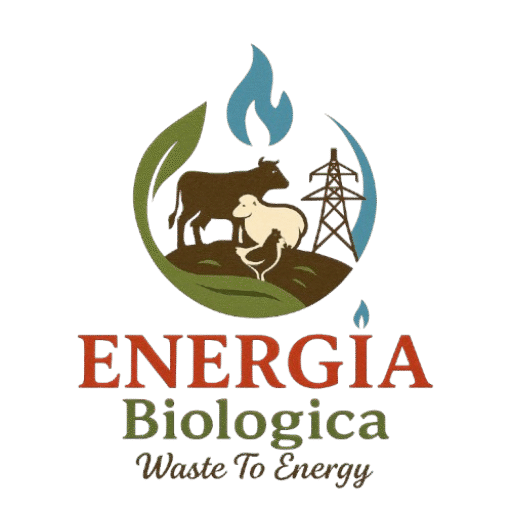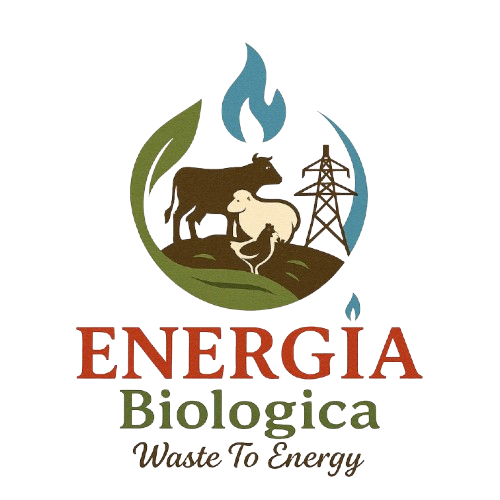Bridging the Gap: Biogas as a Solution to Nigeria’s Gas Shortages
Nigeria, Africa’s largest economy and a major oil and gas producer, paradoxically faces persistent and debilitating energy shortages. Despite possessing vast proven natural gas reserves—among the top ten globally—the nation frequently experiences gas scarcity, leading to long queues at gas stations, increased costs for businesses, and widespread reliance on expensive and polluting alternatives like diesel generators and traditional biomass. This energy paradox stifles economic growth, erodes household purchasing power, and undermines industrial productivity. But what if a potent, sustainable solution lies hidden in plain sight, derived from the very waste that plagues our environment?
This article positions biogas as a solution to Nigeria’s gas shortages, highlighting how biomethane, a purified form of biogas, can serve as a viable, affordable, and clean alternative for cooking and industrial use. Energia Biologica Limited, Nigeria’s pioneering biogas industry facilitator, is dedicated to bridging this critical energy gap. Our mission is to catalyse sustainable biogas development in Nigeria, working as a strategic integrator to bring together the finance, technology, construction, and operations partners required to transform organic waste into reliable energy, fostering a true waste-to-wealth revolution.
Nigeria’s Gas Paradox: Abundance Amidst Scarcity
Nigeria boasts an estimated 210.5 trillion cubic feet of proven natural gas reserves, making it the largest in Africa. Yet, inefficiencies in infrastructure, underinvestment, gas flaring, pipeline vandalism, and a heavy reliance on imported refined products mean that access to clean cooking gas (LPG) and gas for industrial use remains intermittent and expensive. For millions of Nigerian households, particularly in rural and peri-urban areas, this scarcity forces continued dependence on firewood, charcoal, and kerosene, leading to significant health issues from indoor air pollution and rampant deforestation. Industries, too, bear the brunt, with unpredictable gas supply disrupting operations and forcing reliance on high-cost alternatives.
The solution isn’t necessarily to drill for more fossil gas, but to tap into a readily available, constantly regenerating resource: organic waste. This is where biogas, specifically its upgraded form, biomethane, emerges as a strategic answer to Nigeria’s gas shortages.
Biomethane: The Renewable Equivalent of Natural Gas
Biogas, produced through the anaerobic digestion of organic matter (such as agricultural waste, animal manure, and municipal organic waste), is primarily a mixture of methane (CH4) and carbon dioxide (CO2). Through a purification process called “upgrading,” the carbon dioxide and other trace impurities are removed, yielding biomethane. This biomethane is chemically identical to natural gas (methane) and boasts a high calorific value, making it an excellent fuel.
Key characteristics of biomethane that make it an ideal alternative for Nigeria:
- Direct Replacement for LPG: Biomethane can be compressed into cylinders, much like LPG (Liquefied Petroleum Gas). These biogas cylinders Nigeria can be seamlessly integrated into existing cooking infrastructure, allowing households and small businesses to use their current gas stoves without modifications. This ease of adoption is critical for widespread impact.
- Decentralized Production: Unlike fossil natural gas, which often requires extensive pipeline networks from distant extraction sites, biomethane can be produced locally, wherever organic waste is abundant. This decentralized production model reduces logistical complexities, transportation costs, and vulnerability to pipeline disruptions, fostering genuine energy independence Nigeria.
- Versatile Applications: Beyond cooking, biomethane can be used for various purposes:
- Industrial Fuel: Many Nigerian industries currently rely on expensive diesel or intermittent grid electricity. Biomethane offers a stable and cost-effective alternative for boilers, furnaces, and other industrial processes requiring thermal energy.
- Power Generation: Biomethane can fuel generators to produce electricity for industrial parks, communities, and commercial establishments, contributing to clean energy Nigeria.
- Transportation Fuel: When compressed (Compressed Biogas or CBG), biomethane can also serve as a clean fuel for vehicles, offering a greener alternative to petrol and diesel, particularly for fleets operating within cities or agricultural zones.
Learning from Success: India’s Biogas Revolution
India, a nation with a large population and similar energy and waste management challenges to Nigeria, has made significant strides in deploying biogas and biomethane solutions. Their Sustainable Alternative Towards Affordable Transportation (SATAT) initiative, launched in 2018, aims to establish 5,000 compressed biogas (CBG) plants by 2024 (now extended to 2030), demonstrating a clear policy drive to integrate CBG into the national energy mix.
Key lessons from India’s success include:
- Policy Support and Incentives: The Indian government has implemented policies like long-term assured offtake prices for CBG by oil marketing companies, financial assistance for plant setup (including biomass aggregation machinery), and favorable lending terms (placing CBG under priority lending). They are even exploring mandatory blending obligations for CBG in Compressed Natural Gas (CNG) and Piped Natural Gas (PNG).
- Market Integration: By ensuring that biomethane can be injected into existing gas grids and sold through existing fuel station networks, India has created a viable market for the renewable gas.
- Value Chain Development: India’s success involves robust support for the entire CBG value chain, from feedstock procurement (often involving farmers) to digestate utilization as bio-manure, fostering a strong circular economy model.
- Public-Private Partnerships: Government initiatives are complemented by significant investment from public sector undertakings and increasing participation from the private sector, creating a dynamic ecosystem for growth.
India’s experience provides a compelling blueprint for Nigeria, demonstrating that with strategic policy, investment, and collaboration, biomethane can indeed become a game-changer for energy security and sustainability.
Energia Biologica: Your Partner in Closing the Gas Gap
Realizing the full potential of biomethane in Nigeria requires a concerted effort to overcome existing barriers, including high upfront capital costs, limited technical expertise, and fragmented waste collection systems. This is precisely where Energia Biologica Limited excels as a strategic integrator and facilitator.
Our mission of catalysing sustainable biogas development in Nigeria is rooted in our comprehensive, partnership-driven approach:
- De-risking Investments: We identify high-potential feedstock locations (e.g., concentrated livestock areas, major agricultural zones, urban organic waste streams), conduct thorough feasibility studies, and help structure bankable projects that attract both local and international investment.
- Technology Deployment: We collaborate with best-in-class technology providers to deploy efficient and robust anaerobic digestion plants capable of producing high-quality biogas and biomethane suitable for various applications. Our focus is on proven biogas technology tailored to local conditions.
- Value Chain Optimization: From ensuring a consistent supply of organic waste feedstock to establishing efficient distribution channels for biomethane (whether bottled for cooking or piped for industrial use), we manage the entire value chain. This includes supporting the development of systems for digestate utilization as organic fertilizer, further enhancing the project’s sustainability and economic returns.
- Capacity Building: We prioritize local content development, ensuring that Nigerian personnel are trained in the operation and maintenance of biogas facilities, fostering local expertise and job creation.
By working collaboratively with government agencies, private sector players, and local communities, Energia Biologica is uniquely positioned to help Nigeria bridge the gap in its energy supply, transforming abundant waste into a reliable source of clean gas.
A Future Powered by Nigeria’s Own Resources
The persistent challenges of gas shortages in Nigeria present not just a problem, but a profound opportunity for innovation and self-reliance. Biomethane, derived from the nation’s vast organic waste resources, offers a scalable, sustainable, and economically viable solution for both domestic cooking and industrial applications. It is a pathway to greater energy security, reduced reliance on volatile fossil fuel markets, improved public health, and significant environmental benefits.
By investing in biogas development in Nigeria, we are not merely addressing a supply deficit; we are building a foundation for a more resilient, prosperous, and green economy. The time is ripe for Nigeria to fully embrace its waste-to-wealth potential and secure a brighter energy future.
Connect with Energia Biologica to explore collaborative frameworks for advancing Nigeria’s renewable energy goals through integrated biogas solutions.
Join us in fuelling Nigeria’s progress with sustainable, locally-produced energy.

